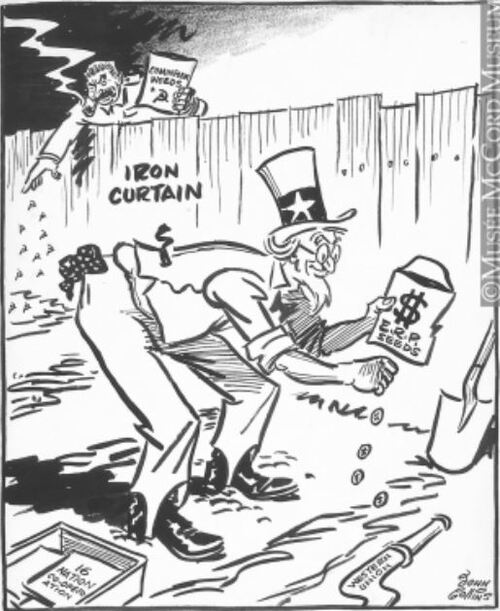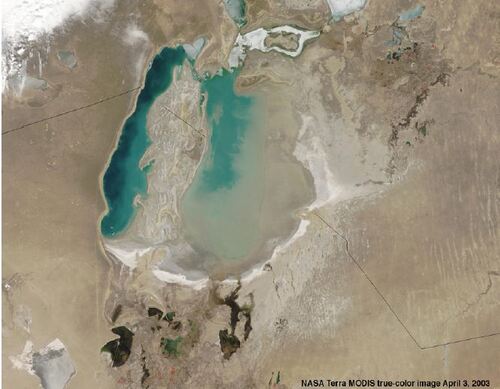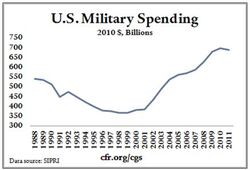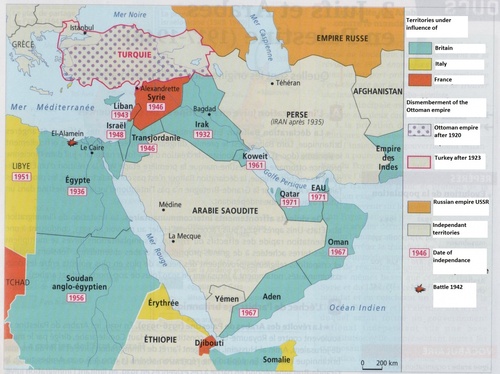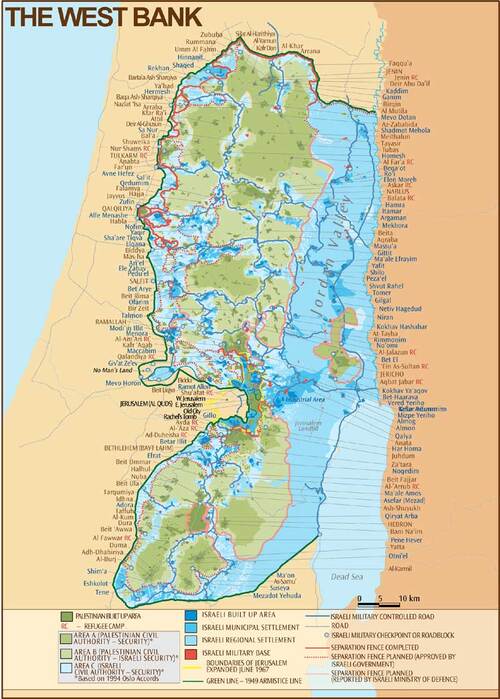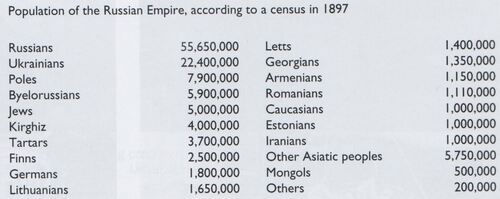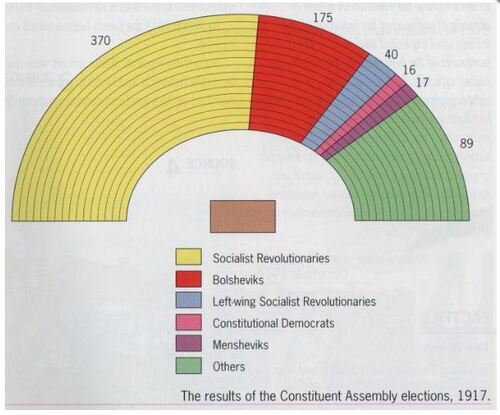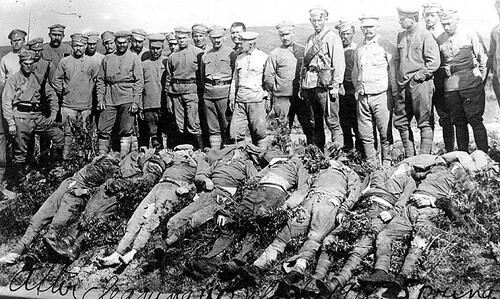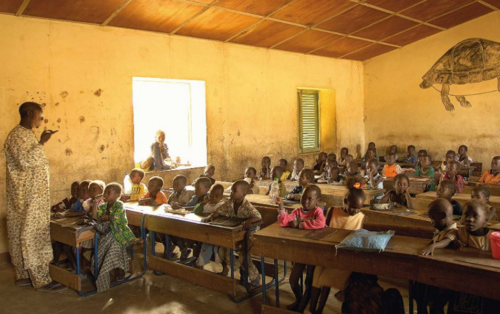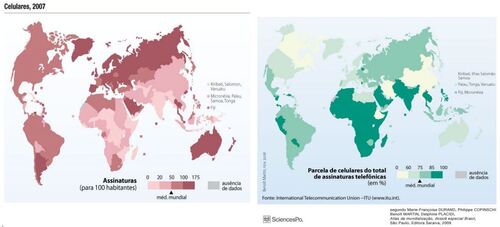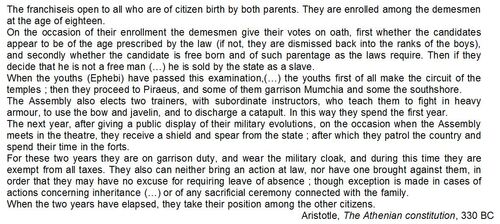-
Source 1Mr. President, Mr. Speaker, Members of the Congress of the United States,(…) At the present moment in world history nearly every nation must choose between alternative ways of life. The choice is too often not a free one.One way of life is based upon the will of the majority, and is distinguished by free institutions, representative government, free elections, guarantees of individual liberty, freedom of speech and religion, and freedom from political oppression.The second way of life is based upon the will of a minority forcibly imposed upon the majority. It relies upon terror and oppression, a controlled press and radio ; fixed elections, and the suppression of personal freedoms.I believe that it must be the policy of the United States to support free peoples who are resisting attempted subjugation by armed minorities or by outside pressures. I believe that we must assist free peoples to work out their own destinies in their own way. I believe that our help should be primarily through economic and financial aid which is essential to economic stability and orderly political processes.The world is not static, and the status quo is not sacred. But we cannot allow changes in the status quo in violation of the Charter of the United Nations by such methods as coercion, or by such subterfuges as political infiltration. In helping free and independent nations to maintain their freedom, the United States will be giving effect to the principles of the Charter of the United Nations. (…)The seeds of totalitarian regimes are nurtured by misery and want. They spread and grow in the evil soil of poverty and strife. They reach their full growth when the hope of a people for a better life has died. We must keep that hope alive. The free peoples of the world look to us for support in maintaining their freedoms. (…)Harry S. TRUMAN, Address before a joint session of Congress, March 12, 1947. Questions on main document :1. Present the document.2. What is Truman’s analysis on the international situation at the end of World War II ?3. What commitment does he take, according to which values ?4. What are the effects of the Truman doctrine ? Source 2 : Cartoon by Leslie Illingworth, June 1947
Source 3 : Cartoon by John COLLINS, Spring Planting. By 1948.Text on Stalin’s packet : Communist seedsText on Uncle Sam’s packet : European Recovery Program SeedsText on the book : 16 Nation Co-operationText on the pipe : Western Union votre commentaire
votre commentaire
-
HISTOIRE : Les Etats-Unis et le monde : l'hyperpuissance américaine et ses limites de 1991 à 2012
The US and the world : American superpower and its limits (1991-2012) : foreign policy
Notions
Unilateralism / Multilateralism
Superpower / Hyperpower
Hard Power / Soft Power / Smart Power
Free trade and capitalism
Democracy
Neoconservatism
Enlargement (Clinton) / New World Ordrer
Terrorism
Decline
HISTOIRE : La Palestine enjeu de conflits depuis 1947
Palestine since 1947 : at the center of tensions
On s'arrête au traitement chronologique autour de 2011 en évitant les sujets d'actualité
Notions :
Middle East
Mandate
Zionism
Islam
Intifada
Palestinian Authority
Settlements
Occupied Territories
Refugees
Status of Jerusalem
Terrorism
GEOGRAPHIE : Etude de cas : un produit mondialisé
A case study of a globalized product
Notions
Globalization
Global cities
Integration
Process
Flows
Networks
ICT (Information & Communication Technology)
TNC (Transnational Company)
FDI (Foreign Direct Investment)
NIDL (New International Division of Labour)
Relocation
Triad
Emerging countries / markets / economies
Developing countries
Least Developed Countries
Territories
Actors
Criticism
What is the nature of the source ?
a chart, a graph un graphique, une courbe
a diagram un schéma
a chart, a table un tableau (statistique)
statistics des statistiques
a figure un chiffre, une donnée chiffrée
a survey une enquête, un sondage
an age pyramid une pyramide des âges
a flow-chart un organigramme
a pie chart un diagramme circulaire
a bar graph un diagramme en bâton
a compound bar graph un histogramme
a climate graph un diagramme ombro-thermique
a map une carte
a cartogram une carte en anamorphose
the key la légende (/ carte)
the scale l’échelle (idem)
a world map,a planisphere une carte du monde, un planisphère
a sketch un croquis, une esquisse
symbols / drawings figurés
graded shading / coloured areas figurés de surfaces
lines, flow lines figurés linéaires
dots figurés ponctuels
a title un titre
a headline un gros titre (presse)
heading / subheading / subtitle titre / sous-titre (sur un doc.)
a quotation une citation
an advertisement / advert/ ad une publicité
a poster une affiche
a picture / a painting une peinture, un tableaua drawing un dessin
a cartoon / a caricature un dessin humoristique / une caricature
a speech balloon une bulle
a caption sous-titre, légende (pour un dessin)
a pun (on words) un jeu de mots
a comic strip une B.D.
a postcard une carte postale
a leaflet un prospectus
a banknote un billet de banque
a biography une biographie
a novel un roman
a diary un journal
a newspaper article un article de journal
a magazine article un article de revue
a play une pièce de théâtre
a work of art une oeuvre d’art
a photograph /photo une photographie
a high angle shot / from above une photo en plongée
a low angle shot une photo en contre-plongée
a news photograph une photo d’actualité
a celebrity picture une photo de célébritéWho is the author ? When was the source produced ? Is there a title ? What is the
origin of the source?
This is a painting / a text by …, written in …. It is called …
This photograph is extracted / taken … from a newspaper / a film… entitled…
The photographer / painter / cartoonist is called / named …Expressing consequence
Niveau seconde :
So, then, as a result, as a consequence, consequently
that’s why, that is the reason why + Sujet +Verbe
the reason why / the reason for
with far-reaching consequences (aux conséquences énormes)
it follows from this that
which means (ce qui implique, signifie)
Niveau première :
thus, therefore, accordingly
to result in … (avoir pour résultat, csq de …)
hence (d’où …, de là …)
to involve (impliquer)
Expressing cause
Niveau seconde :
because, as, since
for (car)
because of
to cause, to provoke
Niveau première :
due to, owing to, thanks to + GN
all the more so as
to bring about, to entail (causer, provoquer, entraîner)
to trigger off (déclencher)
Expressing possibility or condition
Niveau seconde :to enable sb to do stg, to permit, to allow, to let
supposing that
if
Niveau première :
provided/providing, as long as + noun + verb in case (au cas où) suppose/supposing
(à supposer que) on condition that (à condition que) so long as / as long as (à
condition que)
Expressing comparison
Niveau seconde :
superiority, inferiority, equality : more … than ; less … than ; as… as…
as much … as, as many … as
By comparison, …
In comparison with …
Compared with …
To compare, to draw a comparison, to make a comparison
To contrast with …
In contrast with …
Different from …
Some irregular forms :
Good, better, the best
Bad, worse, the worstNiveau première :
Expressions such as : twice as much as, three times bigger than
Fewer, less
Discrepancy (désaccord, divergence, contradiction)
Identical, similar
Expressing aim, desire
Niveau seconde :
(In order) to # (in order) not to + BV
so as to # so as not to + BV
for + GN + (not) + to + BV
so that + GN + may / might / could + BV
to intend to BV
to be determined to # to be reluctant toNiveau première :
Aim : to aim at BV+ing
to plan sthg / to BV
Expressing desire or motivation
I would like / love (sb) to +BV
I feel like + ing
I wish you’d + BV
If only I / you + preterit modal
I wish I / you + preterit modal
I would appreciate if …
She is looking forward to + ing
I dream of + GN / +ing
I hope to + BV
I’m dying for + GN / to + BV
Expressing advice
Advice : Sujet + HAD BETTER + BV
Advice : Sujet + SHOULD + (NOT) + BV
what about / how about + BV-ing stg ? (pourquoi ne pas faire ceci ?)
to advise sb (not) to BV stg
to suggest (I suggest you work harder / you should work harder)
Expressing agreement / disagreement
Niveau seconde :
to agree with # to disagree with
questionable (contestable)
it is wrong to say that / it is true to say that
I don’t share her opinion
He seems to miss the point
To blame sb for BV + ing stg, to reproach sb with BV + ing stg, to accuse sb of BV +ing stg
Niveau première :
to take sides (with sb on/in a matter) (prendre parti avec qn sur une question)
to raise objections (soulever des objections)
to refute a claim (réfuter un argument)
to approve of / to disapprove of / I strongly disapprove of his attitude
Sujet + SHOULD + NOT + have + pp
Expressing habit
Niveau seconde :
would + BV
Niveau première :
to be used to + BV - ing
Expressing probability
Niveau seconde :Using modal verbs (from high probability or certainty to low probability):
Must/can (that must be true / it can’t be true); should; may / could; might
Using other verbs :
to be sure to
Using adverbs:
Perhaps, maybe, probably
Surely, certainly, for sure
Niveau première :
to be likely to vs. to be unlikely (être probable # être improbable)
to be bound to
to ought to
Expressing paradox, opposition or contrast
Niveau seconde :
in spite of + GN, despite + GN
however, yet
though ~ although + subject + verb (bien que)
On the one hand …, on the other hand …
On the contrary
While, whereas (+ noun + verb)
Niveau première :
Still, yet (cependant, toutefois)
conversely
Even though, even if (même si)
Conversely (en revanche, réciproquement)
In any case
Unlike +GN, contrary to + GN, by contrast (contrairement à)
Expressing quantity
Niveau seconde :
Some – a certain quantity
A lot of – a large quantity
Most – the major part
Few – a small quantity
Many – a large number of
Several – more than a few
most people / the (vast) majority of people
! little et much renvoient à des indénombrables ! few et many à ce que l’on peut
compter !
Expressing arguments (pros and cons)
Niveau seconde :
On the one hand …, on the other hand …
First, … / First of all, … / First and foremost, …./ To begin with, …
Secondly, … / Then, …
Lastly, … / Finally, … / Eventually, …
In addition to that, … / On top of that, …Summing up one’s ideas and concluding :
To conclude, …/ To sum up …
Giving one’s personal opinion : As far as I am concerned …
According (to the author)
Niveau première :
Besides, … / Moreover, … / What is more, … / Furthermore, …
All things considered … /All in all … / Finally … / On the whole … / In a word …
Similarly, … / Likewise, …
To my mind, …/ Personally … / In my opinion …
To buttress an argument (étayer un argument)
To question an argument (remettre en cause un argument)
Unfounded ~ groundless (sans fondement)
Convincing ~ forceful (concaincant, puissant, efficace)
Misleading (trompeur, fallacieux)
Debatable , questionable, arguable # undisputable, unquestionable (discutable #
indiscutable)
to weigh the pros and cons (peser le pour et le contre)
Expressing conviction
Niveau seconde :
One thing is sure / certain
It is clear / it is obvious that … (Il est certain, évident, que …)
No doubt that …
Beyond any doubt …(sans le moindre doute, en toute certitude, …)
No wonder that … (pas surprenant que …)
It is a fact that …
Niveau première :
Needless to say that …(Inutile de dire que …)
It goes without saying that …(Cela va sans dire que …)
There is no denying that / it is undeniable that … (Il est indéniable que …)
The Prime minister’s arguments don’t carry much weight / are not very convincing
Expressing obligation
Niveau seconde :
To have + infinitive complet
To be obliged to / to be compelled to (être obligé de, être contraint à , être forcé à)
To be necessary / to be imperative / essential / capital
Niveau première :
To be + infinitive complet (you are to work tomorrow – tu dois travailler demain)
You’re supposed to … (tu es censé …)
Expressing coercion / pressure
Niveau seconde :
To order, to request, to command, to ask (ordonner, demander, commander)
to expect sthg from sb, to invite, to want (attendre qch de qn, inviter, demander)
to forbid + proposition infinitive (interdire)
To have + infinitif (devoir, être dans l’obligation de)(attention : “to be + infinitif” signifie devoir, au sens d’avoir prévu de faire qch, d’avoir
projeté)
Expressing uncertainty
Niveau seconde :
It would seem that …
The figure might / may …
This could explain …
It is difficult to believe that …
One might justifiably suppose that …
This argument leads one to believe that …
One may suppose that …
Niveau première :
Indisputably
Undeniably
Undoubtedly
It remains to be seen whether …
The least one can say is that …
Expressing permission / prohibition
Niveau seconde :
You can
It is all right if … it is OK if …
To be allowed to / be permitted to / be entitled to / have a right to (+verb)
to be forbidden to (+verb)
She allowed me to … / she let me …
Niveau première :
To be prohibited to / To ban sb from doing sthg
Do you mind if … ? (cela vous ennuie si … ?)
To be to… Germany was to limit its armament after WWI
You may smoke on the premises
To grant sb the right to do sthgExpressing a period
• In the 19th century / in the early / late 19th century : Au 19ème / au début du / à la fin du
19ème siècle.
• Early in the century : au début du siècle
• At the end of the millenium : à la fin du millénaire
• In the 1930s : Dans les années 30
• During the 20s : Pendant les années 20.
• From the 20s to the 40s : des années 20 aux années 40
• Towards the beginning/ the end of : vers le début/ la fin
• In the middle of the century : au milieu du siècle.
• The war lasted for 6 years : la guerre a duré 6 ans.
• Since the beginning of the civil war: depuis le début de la guerre civile.
• Until the arrival of the Romans : avant l’arrivée des Romains.Expressing a date
• Around/About 1910/circa (ca.) 1910 : vers 1910
• By 1914, the French and the British had come together
• In 1914, the war beganHow to state a point of view
Expressing an opinion (one’s opinion or the opinion of an author)
In my view…
In my opinion…
As for me…
I share the opinion that…
Personally, I would tend to think that…
I would like to state that…
What we have to realize is…
I’m convinced that…
In other words…
The author claims that… / makes the
assertion that…
The author’s thesis is that …
I agree/disagree with…
I admit that…
I object to…
I think this is true/absurd…
I think it is
biased/unbiased/objective/subjective…
According to…
As far as I know,
It is obvious that…
The author points out that …
emphasizes / pinpoints / highlights /
stresses …
Different kinds of maps :
A globe : un globe
A world map / planisphere/ an atlas map: un planisphère
A physical map : une carte physique
An Ordnance Survey map (OS map – Britain’s national mapping agency) : une carte
« d’état-major » (l’équivalent français serait une carte IGN, et l’équivalent aux Etats-Unis
le programme National Map de l’USGS – US Geological Survey, qui édite des cartes
topographiques) = a topographic or location map
A cartogram / an anamorphosis map: carte par anamorphose : shapes, distance and size
are distorted according to the phenomenon the map shows
A sketch map : un croquis
A dot map : une carte de répartition par points ≠ A shade map
A flow map : une carte des flux
A blank map : un fond de carte
A historical map/ political map/ geographical map/ topographic map /thematic map…
Describe the map
Some useful expressions to locate elements on the map
The location: la localisation
The situation/ the site
North/East/West/South of…
In the north-east/ in the center of…/ In the northern part of…
Northward/ Southward…: vers le Nord, le Sud…
Outside Africa; Large part of America…
Near Hiroshima, next to Tokyo…
Along the coastline: le long de la côte / off the shore : au large des côtes
By the sea : au bord de la mer
Littoralisation/coastal attraction : maritimisation (des activités humaines)
A seabord : une façade maritime - a coastal interface : une interface maritime
A waterfront site : un site en front de merSome useful expressions to describe some phenomena
The map shows…
On a local/ national/ regional / global scale, we can see
On the continent/ On the island/ On the coast / Off the coast
Inland : à l’intérieur des terres
We learn that this land/region/country is inhabited by / populated by
Population distribution : répartition de la population
The arrows show that major/ minor flows come and go from…to…
A hub: un pôle
A spoke: un axe
A cluster: un ensemble, un rassemblement
A population cluster : un foyer de peuplement
A major population area / a secondary population area : un foyer de peuplement
principal / secondaire
A ring: un cercle
Borders/ Boundaries/frontiersThe key (la légende)
Maps use special signs or symbol to represent location and to give information
Areas / graded shading
Coloured area : plage de couleur
Striped area : zone hachurée
Dotted area: zone en pointillés
Lines
Flow line : flux
Arrow: flèche
Dotted line: ligne en pointillés / a broken line / a solid line / a curve
Contour lines: courbe de niveau
Boundary line : limite, frontière…
Drawings or symbols (figurés)
Hachure / hatching : hachure
Stripe: rayure
Hierarchy
To be organized into a hierarchy: être hiérarchisé
A graded shading / colour gradiation: Un dégradé, un gradient de couleurs
Proportional drawings : dessins (représentations) proportionnels
To be proportional to.. : être proportionnel à…
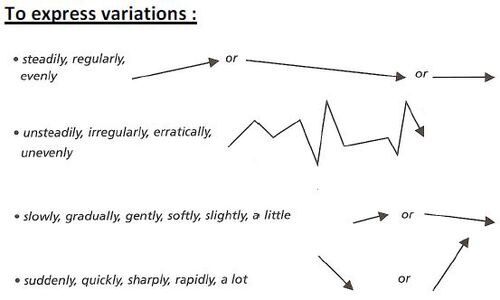

Frequently made mistakes
- L’article défini ne peut pas s’ajouter à un nom déjà défini; ainsi, on dira : Prime Minister Tony Blair, Source 2, King George V, President Roosevelt, …
- L’usage des prépositions et des verbes prépositionnels est à apprendre pour éviter des fautes lourdes. Ainsi, on veillera à dire : the reason for …, to be responsible for …,
to depend on …
- Pour traduire « toujours »/ « encore » : always renvoie à quelque chose de constant, still à quelque chose qui dure encore, again à quelque chose qui se répète
- Les adjectifs de nationalité prennent une majuscule : the English population, the Japanese army, …
- Les adjectifs numéraux, comme tous les adjectifs, ne portent pas la marque du pluriel : 5 million people were demonstrating
- L’historien français parle de documents; l’anglais de « sources »
- Un texte ne « parle » pas : it deals with…, it is about…, the main topic of the text is …
- Revoyez avec votre professeur d’anglais la construction des propositions infinitives : Hitler wanted Great Britain to surrender; Churchill wanted the British people not to
lose hope
- Attention à la concordance des temps dans un énoncé d’histoire. Mind the sequence of tenses ! A history text generally requires the use of the preterit, and if necessary
other tenses for the subordinates clauses.
- Exprimer une date :
In 1914, World War one started.
In March 1933, President Roosevelt launched the New Deal.
On 6 August 1945, the USA dropped the atomic bomb on Hiroshima (Japan). votre commentaire
votre commentaire
-
Gross Domestic product (GDP per capital)
Gross national product
Human dev index
Life expectancy at birth
Literacy rate
Natural increase
Rank
Infant mortality rate
Total fertility rate (>2,1)
Urbanization rate
Sismic area
Outcome/income
Earthquake Globalization
Just in time
Oil and gas
Nuclear power
Development
Mis-developed areas
LDC’s less or least dev countries
MDC’s more dev countries
Emerging countries
Poverty index
Welfare state
Sustainable development
Fair trade
Hub and spoke
Slum
EEZ exclusive eco zone
NATO North Atlantic Treaty organization
NAFTA North Atlantic Free Trade Association
ASEAN Association of south East Asian National
League of Nations
NIC’s Newly Industrialized countries Interface
Exclave
Refugee/ exited
Immigrant/ emigrant/ migration Mainland/ homeland
CAP Common Agri Policy front/rear battleship / warship infantry, artillery, marine, cavalry troops war declaration trenches, barbed-wire, support trenches trench warfare genocide nuclear/conventional weapons war of movement battlefield armistice/peace treaty, cease-fire mustard/phosgene/neurotoxic gas napalm strike, mutineers, desertion, desertor blue helmet position war brutalization guns, canon, weapon, machine guns assault to enlist, join, enrol volunteer
occupation post-war trauma draft aircraft, submarine, tank
censorship, propaganda to challenge the gov
bunker, shield
phoney war cold war
iron curtain red phone ICBM Inter Continental Balistic Missile arms race stalin organ Triple Alliance, Triple Entente
Red Army, White Army
GI's : Government Issue OK 0 killed dog-tag Throw, Detente balance of terror evil empire rogue state new world order diplomacy, diplomatic Berlin wall
FRG : RFA DRG : RDA stakes, issues, concerns actors Red/Black shirt
uniform rationing coup
Gulag, concentration camp, laogaï, extermination camp, gas chamber crematorium, block phonetic alphabet fraud, poll, election, corruption, coalition resistance, collaboration, collaborator, resistant suicide bombing, child soldier totalitarian regime democracy, dictatorship Communism, Socialism, Fascism, Soviet Duma (Russia), Parliament, Knesset (Israel), Reichstag, Blitz, Einsatzgruppen, SA, SS, labor force Supreme Guide, Supreme Soviet, Duce, Führer, to be at risk severe burns, casualties, deads, wounded flee fleet endure operation HQ Head Quarters Great Terror Islamic revolution Arab spring blockade, embargo war of interest violate human rights rape Central Investigation Agency votre commentaire
votre commentaire
-
Humbly shew unto our sovereign lord the King, the Lords and Commons in Parliament assembled,
III. By the statute called the Great Chart of Liberties of England, it is declared and enacted, That no freeman may be taken or imprisoned, or be dismissed of his freehold or liberties, or his free customs, or be outlawed or exiled, or in manner destroyed, but by the lawful judgement of his peers, or by the law of the land ;
VII. And whereas also by authority of Parliament, it is declared and enacted, That no man ought to be adjudged to death but by acts of parliament ;
X. They humbly pray your most excellent Majesty, That no man be compelled to make any gift, loan, benevolence, tax, or such-like charge, without consent by act of parliament ;
Petition of Right, June 7, 1628.
Whereas great delays have been used by Sheriffes, Jailers and other Officers to release many of the King’s subjects detained in prison,
Be it enacted :
I. That when any person shall bring any Habeas Corpus directed unto any Sheriff, the Sheriff shall release him within three days upon charges fixed by the Judge or Court, unless commitment for treason or fellony ;
The Habeas Corpus Amendment Act 1679,An Act for better securing the Liberty of the Subjects and for Prevention of Imprisonments beyond the Seas.
Whereas the Lords and Commons assembled at Westminster, lawfully, fully and freely representing all the estates of the people of this realm, did upon the thirteenth day of february in the Year of our Lord one thousand six hundred eighty-eight present unto their Majesties (...) William and Mary, prince and princess of Orange, being present in their proper persons, a certain declaration in writing, made by the said Lords and Commons in the words following :
II. By assuming and exercising a power of dispending with and suspending of laws and the execution of laws without consent of Parliament ;
IV. By levying money for and to the use of the Crown by pretence of prerogative for other time and in other manner than the same was granted by Parliament
V. By raising and keeping a standing army within the kingdom in time of peace without consent of Parliament ;
VII. By violating the freedom of election of members to serve the Parliament ;
English Bill of Rights 1689, An Act declaring the Rights and Liberties of the Subjects and settling the Succession of the Crown.
Man being born, as been proved, with a Title to perfect Freedom, and an uncontrolled enjoyment of all the Rights
and Privileges of the Law of Nature, equally with any other Man has by Nature a Power, not only to preserve his
Property, that is, his Life, Liberty and Estate, against the injuries and attempts of other Men ; but to judge of, and
punish the breaches (beaking or neglect) of that Law in others.
John Locke, Two treatises of Government, 1690
In every government there are three sorts of power ; the legislative, the executive and the judicial … The political
liberty of the subject is a tranquillity of mind, arising from the opinion each person has of his safety. In order to
have this liberty, it is requisite the government be so constituted as one man need not be afraid of another...
When the legislative and executive powers are united in the same person, or in the same body of magistrates,
there can be no liberty because apprehensions may anse, lest the same monarch or senate should enact
tyrannical laws, to execute them in a tyrannical manner.
Again, there is no liberty, if the power of judging be not separated from the legislative and executive powers. Were
it joined with the legislative, the life and liberty of the subject would be exposed to arbitrary control, for the judge
would then be the legislator. Were it joined to the executive power, the judge might behave with all the violence of
an oppressor…
Must kingdoms in Europe enjoy a moderate government, because the prince, who is invested with the two first
powers, leaves the third to his subjects. In Turkey, where these three powers are united in the sultan’s person the
subjects groan under the weight of a most frightful oppression…
The executive power ought to be in the hands of a monarch ; because this branch of government, which has
always need of expedition, is better administered by one than by many ; whereas, whatever depends on the
legislative power is often better regulated by many than by a single person… His (the King’s) person should be
sacred, because as it is necessary for the good of the state to prevent the legislative body from rendering
themselves arbitrary, the moment he is accused of tried, there is an end of liberty.
Charles de Secondat, Baron de Montesquieu, The Spirit of the Laws (1748)
I see first of all thing that seems to me to be acknowledged both by good and evil persons : that we must reason
in everything because man is not simply an animal but an animal who reasons....
It is to the general will that the individual must address himself to learn how to be a man, citizen, subject, father,
child. It fixes the limits on all duties.. Everything that you conceive, everything that you meditate upon will be
good, elevated, sublime, if it is in the general and common interest... Tell yourself often : I am a man, and I have
no other true, inalienable natural rights than those of humanity.
But, you will say to me, where is this general will kept ? Where can I consult it ? In the principles of written laws
of all the organized nations ... The laws should be made for everyone, and not for one person.
Denis Diderot, the Encyclopedia, 1755
« I am one hundred and seventy-two years old », said the old man. « The kingdom where we live used to be
inhabited by the Incas, who imprudently left it to subdue another part of the world, and were finally exterminated
by the Spaniards. A few noblemen had been wise enough to stay behind in their native country… and that is how
our innocence and happiness have been preserved. The Spaniards had a confused knowledge of the existence of
this country, which they named Eldorado. »
At last, Candide asked wether any religion was practised in the country. The old man blushed slightly. « Religion
! » he exclaimed. « Why, of course, there’s a religion. »
« Do you worship only one God ? »
« Of course we do », said the old man. « What odd questions you foreigners ask ! »
Candide was curious to see some of their priests, and asked where they could be found. The old man smiled.
« My friends », said he, « we are all priests ; the King and the heads of each family perform solemn hymn of
thanksgiving every morning. »
« Do you mean to say you have no monks teaching and disputing, governing and intriguing, and having people
burned if they don’t subscribe to their opinions ? »
« We should be stupid if we had ! We are all the same opinion here, and we don’t know what you mean by
monks. »
Voltaire, Candide or Optimism, 1758 votre commentaire
votre commentaire
-
The Aral sea, a dying sea
Sources : google maps, documents below and this video
Where is the Aral sea ? What is its particularity, for a maritime environment ?
How many countries border the se a?
How is this maritime basin fed ?
How serious is thesituation today ?
How are populations affected ?The Aral Sea was once the world's third or fourth largest lake, but it's not anymore.
Deviation of the lake's rivers for agriculture has caused the lake to shrink and dry up, leaving
behind salt & the rusting remnants of fishing boats and barges. Commercial fishing on the lake
ended in 1982, and today the waters of the Amu Darya and Syr Darya rivers go mostly to irrigate
cotton fields and rice fields in Uzbekistan, Turkmenistan and Tajikistan.
One might argue that the human gain from irrigation of agricultural lands justifies the
destruction of the lake.
However, human loss around the lake is intense: the economy of the lake region has been
devastated, water supplies are fouled (= polluted) or non-existent, infant mortality is soaring,
and thyroid diseases flourish.
A recent dyke on the Syr Daria may chanel the evaporation of the whole sea...
(source: "Requiem for a dying sea" - http://www.oneworld.org/patp/pap_aral.html ) votre commentaire
votre commentaire
-
stakes (issues, concern), actors, process, network, flowsubcontracting : sous traitance
free trade LiberalismTNC's Tran National Companies, MNC's Multi National Compglobal marketinterdependenceglobal cityglobalizationhub and spokegrowthtax havenimport/exportstock exchangecompetitivness WTO World Trade Organizationbalance of trade, in excess/deficit currency policy(ex)change rate invest, investment, investorregulationmonopoly, monopolisticspecializationtechnical progressprotectionismsuppliesabilitiescustom duties : droits de douane
grant, subsidies : subvention
sovereign, sovereignty Kyoto protocoleproductivist, productivityWorld SummitLDC's Less/Least Developed CountriesMDC's More/Most Dev Countriesleadership, partnershipThird WorldAnti-globalistself-sufficient, self-sufficiencyUtopian Socialismraw materials : oil, gas, cottonsoft/hard/smart powerlabor force , workforcecreditor, micro-credit, loan, debt, pay back with interestcrisis, subprimeTobin taxestrade, commerceoil crashHeadquarterssupply chainplants : usine
lead times flux tendus ou just-in-time
safety standardsstrategyrelocationDevelopment: group of social and economic processes which provide added security and higher satisfaction of the needs of the population.
BRICS: Group of original emerging powers composed of Brazil, Russia, India, China which began meeting in 2006. South Africa joined the group in 2011.
Emerging Powers: Southern nations overcoming their underdevelopment and whose economic growth is high. Emerging countries whose importance in the global economy is increasingly greater. Emerging Powers represent a disorganized group.
G3: (IBAS): Trilateral discussion forum between 3 BRIC nations: India, Brazil and South Africa
G8: The Group of Eight is a forum for the governments of eight of the world's largest national economies based on net wealth and GDP; not included are Brazil at 7th and China at 2nd. The G8 is made up of France, Germany, Italy, Japan, the UK, the US and Canada. In 1997, Russia was added to the group which then became known as the G8. The EU is represented within the G8 but cannot host or chair summits
G20: The Group of Twenty) is a group of finance ministers and central bank governors from 20 major economies: 19 countries plus the EU, which is represented by the President of the European Council and by the European Central Bank. The G-20 heads of government or heads of state have also periodically conferred at summits since their initial meeting in 2008. Collectively, the G-20 economies account for approximately 80 percent of the gross world product (GWP), 80 percent of world trade (including EU intra-trade), and two-thirds of the world population
Globalization Index: measurement between 0 and 100 calculated by the federal polytechnic school in Zurich, measures 3 dimensions: economic, social and political levels of globalization based on 24 variables.
GDP (=PIB): wealth generated within a country by both national and foreign companies
GNP (=PNB): wealth generated by national companies within a country and abroad
Governance: group of rules, actors and actions linked to a common question (e.g. regulation of capitalism, sustainable development) and exercising an authority.
HDI: Human Development Index: development indicator which takes into account life expectancy at birth, adult literacy rates and the gross national revenue per capita (which now replaces GDP).
Transnational Company TNC: company having at least one foreign subsidiary
North: group of developed countries, i.e. sovereign states that have a highly developed economy and advanced technological infrastructure relative to other less developed nations. Most commonly, the criteria for evaluating the degree of economic development GDP, the per capita income, level of industrialization, amount of widespread infrastructure and general standard of living. Which criteria are to be used and which countries can be classified as being developed are subjects of debate.
Periphery/Core: opposition between a center (core) which dominates an area and the periphery which is dominated. The 2 groups contribute to uneven flows and can be observed at the city/regional/national and global scale
Polycentrism: world order based on the existence of several centers. In international relations, period of the U.S. as superpower (1991-2001) has been replaced by a new organization, based on economic growth, in which the U.S. must deal with rising powers asserting themselves.
Power: the capacity of a state to influence the behavior of others.
South: group composed of developing countries, also called a less-developed country (LDC), , i.e., a nation with a low living standard, underdeveloped industrial base, and low HDI relative to other countries. There is no universal, agreed-upon criteria for what makes a country developing versus developed and which countries fit these two categories, although there are general reference points such as the size of a nation's GDP compared to other nations.
Triad: group of 3 regions which dominate the world economy: N. America (U.S.A. and Canada), Western Europe and Japan (sometimes includes SE Asian countries and the SE China.)
 votre commentaire
votre commentaire
-
Vocabulary
Cold War
The USSR (Union of Soviet Socialist Republics
A collapse
Bipolar / unipolar / multipolar world
Unilateralism: doctrine or agenda that supports one-sided action.
Multilateralism: multiple countries working in concert on a given issue
New world order: George H. W. Bush used the term to try to define the nature of the post Cold War era, and the spirit of great power cooperation that they hoped might materialize.
Enlargement: The Doctrine of Enlargement asked for
- A free competition in global trade,
- promoting democracy with minimum intervention in foreign political affairs
- while America to be remaining as the global leader.
NATO: North Atlantic Treaty Organization, intergovernmental military alliance based on the North Atlantic Treaty which was signed on 4 April 1949. The organization constitutes a system of collective defense whereby its member states agree to mutual defense in response to an attack by any external party.
Hyper power: used to describe the United States' position as the lone power since the collapse of the Soviet Union in 1991 (during the Cold War, USA and USSR were called Superpower)
Soft power: ability to attract and co-opt rather than coerce, use force or give money as a means of persuasion.
Hard Power: use of military and economic means to influence the behavior or interests of other political bodies.
Islamic fundamentalism: group of religious ideologies seen as advocating a return to the fundamentals of Islam: the Quran and the Sunnah.
Taliban: Islamic fundamentalist political movement which spread from Pakistan into Afghanistan and formed a government, ruling as the Islamic Emirate of Afghanistan from September 1996 until December 2001.
Al-Qaeda: global militant Islamist organization founded by Osama bin Laden in Pakistan. It operates as a network comprising both a multinational army and a radical Sunni Muslim movement calling for global Jihad. It has been designated as a terrorist organization by the United Nations Security Council.
Suicide hijackers: men who commit suicide as a weapon and terrorist tactic.
The War on Terror (also known as the Global War on Terrorism) is a term commonly applied to an international military campaign which started as a result of the 11 September 2001 terrorist attacks on the United States. This resulted in an international military campaign to eliminate al-Qaeda and other militant organizations.
Rogue states: controversial term applied by some international theorists to states they consider threatening to the world's peace. The term is used most by the United States, though the US State Department officially quit using the term in 2000.
Guantanamo: controversial United States military prison located within Guantanamo Bay Naval Base (Cuba) that was established in January 2002 in order to detain extraordinarily dangerous prisoners, to interrogate prisoners in an optimal setting, and to prosecute prisoners for war crimes.
Anti-Americanism or anti-American sentiment: refers to opposition or hostility to the policies, culture, society, economics, international, or superpower role of the United States.
Neo-conservatism : A belief deriving from religious conviction that the human condition is defined as a choice between good and evil and that the true measure of political character is to be found in the willingness by the former (themselves) to confront the latter. AND An assertion that the fundamental determinant of the relationship between states rests on military power and the willingness to use it. AND A primary focus on the Middle East and global Islam as the principal theater for American overseas interests.
Smart Power: combination of hard power and soft power strategies.
New Beginning: name of a speech delivered by United States President Barack Obama on 4 June 2009, at Cairo University in Egypt. The speech honors a promise Obama made during his presidential campaign to give a major address to Muslims from a Muslim capital during his first few months as president.
Events
- 1989: Defeat and withdrawal (retrait) from Afghanistan
- November 9th, 1989: Fall of the Berlin Wall
- September 12th, 1990: Reunification of Germany
- 1991: Collapse of the USSR. USSR was destabilized by a vast economic crisis, its state is undermined by mafias and its world influence got weaker (-40% of its lands)
- August 1990: Iraqi invasion of Kuwait
- January 1991: Gulf War, codenamed Operation Desert Storm (17 January 1991 – 28 February 1991), a war waged by a U.N.-authorized coalition force from 34 nations led by the United States against Iraq in response to Iraq's invasion and annexation of Kuwait.
- January 28th, 1992 : State of the Union Adress, George Bush
- 1986-1994: Uruguay Round, The Round led to the creation of the World Trade Organization. The broad mandate of the Round had been to extend GATT trade rules to areas previously exempted as too difficult to liberalize (agriculture, textiles) and increasingly important new areas previously not included (trade in services, intellectual property, investment policy trade distortions).
- 1993: Asia-Pacific Economic Cooperation (APEC), A forum for 21 Pacific Rim member economies that seeks to promote free trade and economic cooperation throughout the Asia-Pacific region.
- 1993: Unified Task Force (UNITAF) was an American-led, United Nations-sanctioned multinational force which operated in Somalia. A United States initiative (code-named Operation Restore Hope), UNITAF was charged to create a protected environment for conducting humanitarian operations in the southern half of the country.
- September 13th 1993: The Oslo I Accord, officially called the Declaration of Principles on Interim Self-Government Arrangements or Declaration of Principles (DOP), was an attempt to set up a framework that would lead to the resolution of the ongoing Israeli–Palestinian conflict. It was the first face-to-face agreement between the government of Israel and the Palestine Liberation Organization (PLO).
- 1994: North American Free Trade Agreement (NAFTA), An agreement signed by Canada, Mexico, and the United States, creating a trilateral trade bloc in North America.
- 1994: NATO intervention in Bosnia and Herzegovina
- November-December 1995: Dayton-Paris Agreement: peace agreement reached near Dayton, in November, and formally signed in Paris on December 1995. These accords put an end to the 3 and a half-year long Bosnian War, one of the armed conflicts in the former Socialist Federative Republic of Yugoslavia.
- 1997: The United States signed but did not ratify the Kyoto Protocol which is an international treaty that sets binding obligations on industrialised countries to reduce emissions of greenhouse gases.
- 1998: The United Stated refused to join the International Criminal Court which is a permanent tribunal to prosecute individuals for genocide, crimes against humanity, war crimes, and the crime of aggression.
- 1998: bombings of Afghanistan and Sudan (codenamed Operation Infinite Reach by the United States), American cruise missile strikes on terrorist bases in Afghanistan and a pharmaceutical factory in Sudan. The attack was in retaliation for the bombings of American embassies in Kenya and Tanzania.
- December 1998: bombing of Iraq (code-named Operation Desert Fox) by the United States and United Kingdom. The contemporaneous justification for the strikes was Iraq's failure to comply with United Nations Security Council resolutions as well as their interference with United Nations Special Commission inspectors.
- 1999: The United Stated refused to ratify the Comprehensive Nuclear-Test-Ban Treaty (CTBT) which is a multilateral treaty by which states agree to ban all nuclear explosions in all environments, for military or civilian purposes.
- 1999: Kosovo war
- 1999: Poland, Hungary and Czech Republic join NATO
- September 11th 2001: 9/11 attacks
- October 7th 2001: the U.S. government launched military operations in Afghanistan with the agreement of UN.
- March 20th 2003: invasion of Iraq starting on by an invasion force led by the United States without the agreement of UN.
- 2007: In light of 9/11 and the war in Iraq, the Bush administration was criticized for placing too much emphasis on a hard power strategy. To counter this hard power strategy, the Center for Strategic and International Studies released the "Commission on Smart Power".
-2009: The Center for Strategic and International Studies, released a second report, "Investing in a New Multilateralism", to address the concept of smart power in international releases.
- 2009: Under the Obama administration, smart power became a core principle of his foreign policy strategy. It was popularized by Hillary Clinton.
- 2011: Obama's "2011 May Speech on the Middle East and North Africa" called for a smart power strategy, incorporating development, in addition to defense and diplomacy, as the third pillar of his foreign policy doctrine.
- 2011: Libyan War
- 2011: Bin Laden’s death
Oral 1 : To what extent are the USA at a turning point with Obama's policy ?
Barack Obama's speech delivered in Cairo, June 4 2009. (video here)
I am honoured to be in the timeless city of Cairo, and to be hosted by two remarkable institutions. For over a thousand years, al-Azhar has stood as a beacon of Islamic learning, and for over a century, Cairo University has been a source of Egypt's advancement. Together, you represent the harmony between tradition and progress. I am grateful for your hospitality, and the hospitality of the people of Egypt. I am also proud to carry with me the goodwill of the American people, and a greeting of peace from Muslim communities in my country: assalaamu alaykum.
We meet at a time of tension between the United States and Muslims around the world – tension rooted in historical forces that go beyond any current policy debate. The relationship between Islam and the west includes centuries of co-existence and co-operation, but also conflict and religious wars. More recently, tension has been fed by colonialism that denied rights and opportunities to many Muslims, and a cold war in which Muslim-majority countries were too often treated as proxies without regard to their own aspirations. Moreover, the sweeping change brought by modernity and globalisation led many Muslims to view the west as hostile to the traditions of Islam.
Violent extremists have exploited these tensions in a small but potent minority of Muslims. The attacks of September 11 2001 and the continued efforts of these extremists to engage in violence against civilians has led some in my country to view Islam as inevitably hostile not only to America and western countries, but also to human rights. This has bred more fear and mistrust.
So long as our relationship is defined by our differences, we will empower those who sow hatred rather than peace, and who promote conflict rather than the co-operation that can help all of our people achieve justice and prosperity. This cycle of suspicion and discord must end.
I have come here to seek a new beginning between the United States and Muslims around the world; one based upon mutual interest and mutual respect; and one based upon the truth that America and Islam are not exclusive, and need not be in competition. Instead, they overlap, and share common principles – principles of justice and progress; tolerance and the dignity of all human beings.
I do so recognising that change cannot happen overnight. No single speech can eradicate years of mistrust, nor can I answer in the time that I have all the complex questions that brought us to this point. But I am convinced that in order to move forward, we must say openly the things we hold in our hearts, and that too often are said only behind closed doors. There must be a sustained effort to listen to each other; to learn from each other; to respect one another; and to seek common ground. As the Holy Koran tells us: "Be conscious of God and speak always the truth." That is what I will try to do – to speak the truth as best I can, humbled by the task before us, and firm in my belief that the interests we share as human beings are far more powerful than the forces that drive us apart.
 votre commentaire
votre commentaire
-


Balfour Declaration 1917
November 2nd, 1917
Dear Lord Rothschild,
I have much pleasure in conveying to you, on behalf of His Majesty's Government, the following declaration of sympathy with Jewish Zionist aspirations which has been submitted to, and approved by, the Cabinet.
"His Majesty's Government view with favour the establishment in Palestine of a national home for the Jewish people, and will use their best endeavours to facilitate the achievement of this object, it being clearly understood that nothing shall be done which may prejudice the civil and religious rights of existing non-Jewish communities in Palestine, or the rights and political status enjoyed by Jews in any other country."
I should be grateful if you would bring this declaration to the knowledge of the Zionist Federation.
Yours sincerely,
Arthur James Balfour
Middle-East 1918-1945
British White Paper of June 1922
The tension which has prevailed from time to time in Palestine is mainly due to apprehensions, which are entertained both by sections of the Arab and by sections of the Jewish population. These apprehensions, so far as the Arabs are concerned are partly based upon exaggerated interpretations of the meaning of the Balfour declaration favouring the establishment of a Jewish National Home in Palestine, made on behalf of His Majesty's Government on 2nd November, 1917.
In this connection it has been observed with satisfaction that at a meeting of the Zionist Congress, the supreme governing body of the Zionist Organization, held at Carlsbad in September, 1921, a resolution was passed expressing as the official statement of Zionist aims "the determination of the Jewish people to live with the Arab people on terms of unity and mutual respect, and together with them to make the common home into a flourishing community, the upbuilding of which may assure to each of its peoples an undisturbed national development."
Further, it is contemplated that the status of all citizens of Palestine in the eyes of the law shall be Palestinian, and it has never been intended that they, or any section of them, should possess any other juridical status.
During the last two or three generations the Jews have recreated in Palestine a community, now numbering 80,000, of whom about one fourth are farmers or workers upon the land. This community has its own political organs ; (…) This community, then, with its town and country population, its political, religious, and social organizations, its own language, its own customs, its own life, has in fact "national" characteristics.
(…) the Declaration of 1917, (…) does not contain or imply anything which need cause either alarm to the Arab population of Palestine or disappointment to the Jews.
For the fulfilment of this policy it is necessary that the Jewish community in Palestine should be able to increase its numbers by immigration. This immigration cannot be so great in volume as to exceed whatever may be the economic capacity of the country at the time to absorb new arrivals.
Nevertheless, it is the intention of His Majesty's overnment to foster the establishment of a full measure of self government in Palestine. But they are of the opinion that, in the special circumstances of that country, this should be accomplished by gradual stages and not suddenly.

Declaration of Israel's Independence 1948
Issued at Tel Aviv on May 14, 1948 (5th of Iyar, 5708)
ERETZ-ISRAEL [(Hebrew) - The Land of Israel] was the birthplace of the Jewish people. Here their spiritual, religious and political identity was shaped. Here they first attained to statehood, created cultural values of national and universal significance and gave to the world the eternal Book of Books. (...)
The catastrophe which recently befell the Jewish people - the massacre of millions of Jews in Europe - was another clear demonstration of the urgency of solving the problem of its homelessness by re-establishing in Eretz-Israel the Jewish State, which would open the gates of the homeland wide to every Jew and confer upon the Jewish people the status of a fully privileged member of the comity of nations. (...)
WE DECLARE that, with effect from the moment of the termination of the Mandate being tonight, the eve of Sabbath, the 6th Iyar, 5708 (15th May, 1948), until the establishment of the elected, regular authorities of the State in accordance with the Constitution which shall be adopted by the Elected Constituent Assembly not later than the 1st October 1948, the People's Council shall act as a Provisional Council of State, and its executive organ, the People's Administration, shall be the Provisional Government of the Jewish State, to be called "Israel". (...)
WE EXTEND our hand to all neighboring states and their peoples in an offer of peace and good neighborliness, and appeal to them to establish bonds of cooperation and mutual help with the sovereign Jewish people settled in its own land. The State of Israel is prepared to do its share in a common effort for the advancement of the entire Middle East.
WE APPEAL to the Jewish people throughout the Diaspora to rally round the Jews of Eretz-Israel in the tasks of immigration and upbuilding and to stand by them in the great struggle for the realization of the age-old dream - the redemption of Israel. (...)
(Signatures : David Ben Gourion and 35 others)
History of Jerusalem 10/12 : link to youtube
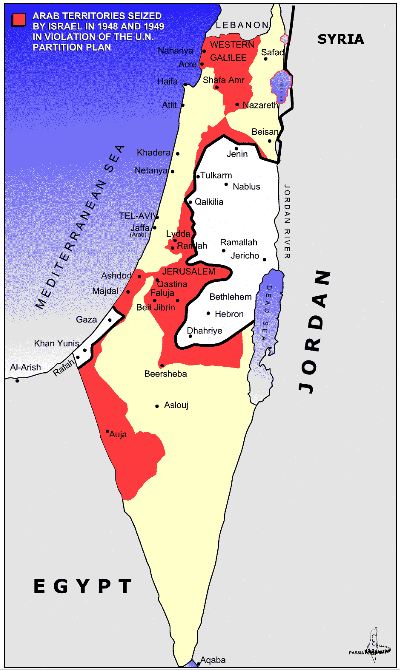
Jerusalem, a source for conflict in the Middle-East
Question
-
Present the documents.
-
Why is 1967 a special year in the history of the Middle-East ?
-
Was the role played by the UN efficient ? Why ?
-
To what extent is Jerusalem the key question in this long-term crisis ?
Main source
United Nations Security Council Resolution 242 (full text)
NOVEMBER 22, 1967
The Security Council,
Expressing its continuing concern with the grave situation in the Middle East,
Emphasizing the inadmissibility of the acquisition of territory by war and the need to work for a just and lasting peace in which every State in the area can live in security,
Emphasizing further that all Member States in their acceptance of the Charter of the United Nations have undertaken a commitment to act in accordance with Article 2 of the Charter,
Affirms that the fulfillment of Charter principles requires the establishment of a just and lasting peace in the Middle East which should include the application of both the following principles:
Withdrawal of Israeli armed forces from territories occupied in the recent conflict;
Termination of all claims or states of belligerency and respect for and acknowledgement of the sovereignty, territorial integrity and political independence of every State in the area and their right to live in peace within secure and recognized boundaries free from threats or acts of force;
Affirms further the necessity
For guaranteeing freedom of navigation through international waterways in the area;
For achieving a just settlement of the refugee problem;
For guaranteeing the territorial inviolability and political independence of every State in the area, through measures including the establishment of demilitarized zones;
Requests the Secretary General to designate a Special Representative to proceed to the Middle East to establish and maintain contacts with the States concerned in order to promote agreement and assist efforts to achieve a peaceful and accepted settlement in accordance with the provisions and principles in this resolution;
Requests the Secretary-General to report to the Security Council on the progress of the efforts of the Special Representative as soon as possible.
Additionnal source :West bank map, 2003.




VIDEO The Atlantic : cliquez ici
Wailing wall, Promised Land, Near East, Midle East, Temple Mount, Yahve/Adonai, Dome of the Rock, Al Aksa mosque, Mekka, footprints, muslim, Lebanon, Syria, Saoudi Arabia, Golan heights, Gaza strip, agreement, partition/share, secret talks/negociation
claim emphasize withdrawal independence belligerent sovereign boundaries/border settlement commitment waterways immigration/emigration refugee/camp fulfillment occupation demilitarization Zionism Promised land/national home cease-fire/treaty/armistice Nationalism segregation Green Line inviolability British/French/external influence allied condominium agreement/accord resolution/declaration/charter white paper riot/revolution/rebellion/civil war/bombing terrorism rebuild/reconstruction collapse/fall/decline damage/casualties/victims oil/gas strategy/diplomacy land loss endebtment/debt controlled zone landownership hatred partition/separation council regular army/militia conventional forces/nuclear power to free/liberate surrender acknowledgement mandate/protectorate League of Nation/United Nations NATO Arabian League (anti-)colonialism/imperialism Panarabism desalinization, aquifer, over-exploitation, importation, agreement,
FRISE CHRONO Moyen Orient en pdf à télécharger ici
 votre commentaire
votre commentaire
-
-
1897 census
1900 Russian village
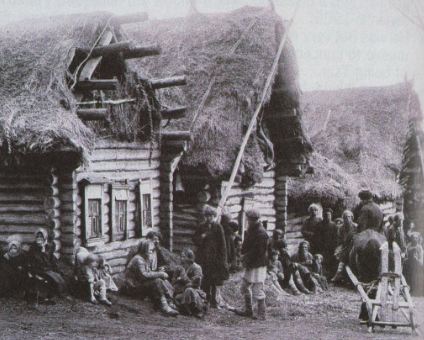
Russia 1901
1903 Factory dormitory Moscow
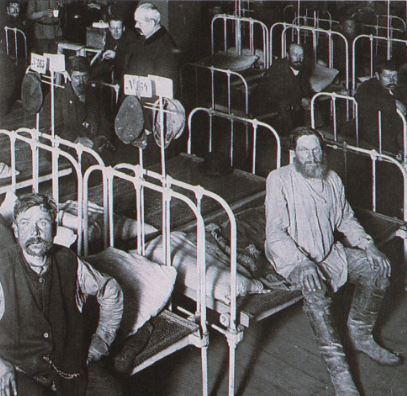
1905 Petition to the Tzar

1905 Bloody Sunday
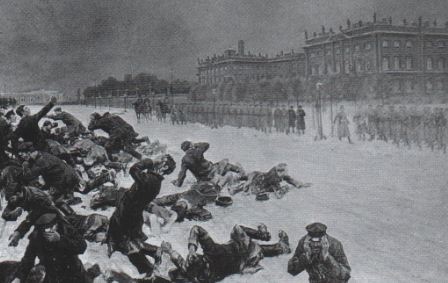
Petrograd police report for Octoher 1916, in response to the Minister of the lnterior’s circular of 1915 asking local police for monthly information on the political situation.
The brilliant success of the offensive of General Brusilov in the spring of the present year and the current solution to the problem of supplying the troops proved convincingly that the task undertaken by the Government and the community has been fulfilled more than successfully. The question of the organization of the army supply may be held to have been satisfactorily settled. (…) But, on the other hand, the disintegration of the rear, that is of the whole country, which is now steadily increasing has today reached such monstrous and extreme form that it has begun to be a menace to the success obtained at the front, and in the very near future promises to throw the country into chaotic, spontaneous and catastrophic anarchy. (…)
All these things have led to an unfair distribution of foodstuffs and articles of prime necessity, an immense and rapid increase in the cost of living, and to inadequacy in sources of supply and means of existence. These factors show that the neglect of the rear is the prime cause of the disorganization of the huge machine of the State, and also contain categorical evidence that a terrible crisis is already on the way and that it must be met in either one way or the other.
The above analysis is entirely confirmed by the extreme anxiety which may be observed everywhere. At the beginning of the present month, September, exceptionally strong feelings of opposition and hostility to the Government were in evidence in every section of the capital’s population… Now, by the end of the month, these hostile feelings, according to reliable evidence, have attained a power among the masses which was without precedent even in 1905-1906.(…)
There is little doubt that rumours that Russia is on the eve of a revolution are exaggerated as compared to the actual conditions, but nevertheless the situation is serious enough to deserve immediate attention.
Video on INA (bottom 1917)
Army in Petrograd feb 1917 Taurid Palace, feb 1917
Taurid Palace, feb 1917
Resolution of the First Provisionnal Government, March 3 1917
The Temporary Committee of the members of the State Duma, with the help and the support of the army and the inhabitants of the capital, has now attained such a large measure of success over the dark forces of the old regime that it is possible for the Committee to undertake the organisation of a more stable executive power.
The actual work of the cabinet will be guided by the following principles :
- An immediate and complete amnesty in all cases of a political and religious nature, including terrorist acts, military revolts and agrarian offences, etc.
- Freedom of speech, press, and assembly, and the right to form unions and to strike and the extension of political freedom to persons serving in the armed forces limited only by the demands of military and technical circumstances.
- The abolition of all restrictions based on class, religion, and nationality.
- The immediate arrangements for the calling on the Constituent Assembly on the basis of universal, equal and direct suffrage and secret ballot, which will determine the form of government and the constitution of the country.
- The substitution of a people's militia for the police, with elective officers responsible to the organs of local self-government.
- Elections to the organs of local self-government are to be held on the basis of universal, equal and direct suffrage and secret ballot.
- Those military units which took part in the revolutionary movement shall be neither disarmed nor withdrawn from Petrograd.
- While preserving strict military discipline on duty and during military service, the soldiers are to be freed from all restrictions in the exercise of those civil rights which all other citizens enjoy.
The Provisional Government wishes to add that it has no intention whatsoever of taking advantage of the military situation to delay in any way the carrying through of the reforms and the measures outlined above.
Source: Izvestiia, 3 March 1917.
Russsians on the front, spring 1917
The April Theses
1 In our attitude towards the war, which under the new government of Lvov and Co. unquestionably remains on Russia’s part a predatory impertalist war owing to the capitalist nature of that goverment, not the slightest concession to revolutionary defencism’ is possible (…)
2 The specific featurc of the present situation in Russia is that the country is PASSING from the first stage of the revolution which, owing to the insufficient class-consciousness and organisation of the proletariat, placed power in the hands of the bourgeoisie to its SECOND stage, which must place power in the hands of the proletariat and the poorest sections of the peasants (…)
3 No support for the Provisional Government ; the utter falsity of all its promises should be made clear, particularly of those relating to the renunciation of annexations. Exposure in place of the impermissible, illusion-breeding “demand” that THIS government, a government of capitalists, should cease to be an imperialist government (…)
4 The masses be rnade to see that the Soviets of Workers Deputies are the ONLY POSSIBLE form of revolutionary government, and that therefore our task is, as long as THIS government yields to the influence of the bourgeoisie, to present a patient, systematic, and persistent EXPLANATION of the errors of their tactics (…)
5 Not a parliamentary republic — to return to a parliamentary republic from the Soviet of Workers’ Deputies would be a retrograde step - but a republic of Workers’, Agricultural Labourers’ and Peasants’ Deputies throughout the country, from top to bottom.
Abolition of the police, the army and the bureaucracy. The salaries of all officials, all of whom are elective and displaceable at any time not to exceed the average wage of a competent worker.
6 The weight of emphasis in the agrarian programme to be shifted to the Soviet of Agricultural Labour’ Deputies.
Confiscation of all landed estates.
Nationalisation of ALL lands in the country, the land to be disposed of by the local Soviets of Agricultural Labourers’ and Peasants’ Deputies(…)
7 The immediate amalgamation of all banks in the country into a single national bank (…)
8 It is not our IMMEDIATE task to ‘introduce’ socialism, but only to bring social production and the distribution of products at once under the CONTROL of the Soviets of Workers’ Deputies.
Vladimir Ilyich Lenin, Collected Works, vol. 24, 1962.The Decree on Land, issued by the Second All-Russian Congress of Soviets (8 November 1917)
1. Private ownership of land shall be abolished for ever. All land shall become the property of the whole people, and pass into the use of those who cultivate it.
Persons who suffer by this property revolution shall be deemed to be entitled to public support only for the period necessary for adaptation to the new conditions of life
6. The right to use the land shall be accorded to all citizens of the Russian State (without distinction of sex) desiring to cultivate it by their own labour, with the help of their families, or in partnership, but only as long as they are able to cultivate it. The employment of hired labour is not permitted.
In the event of the temporary physical disability of any member of a village commune for a period of up to two years, the village commune shall be obliged to assist him for this period by collectively cultivating his land until he is able to work. Peasants who, owing to old age or ill health, are permanently disabled and unable to cultivate the land personally, shall lose their rights to the use of it but, in return, shall receive a pension from the State.
7. Land tenure shall be on an equality basis. There shall be absolutely no restriction on the forms of Iand tenure-household, farm, communal or co-operative, as shall be decided in each individual village and settlement.
The United States Expeditionnary Forces : Bolshevki killed at Vladavostak 1918
Vocabulary Russia
-
democracy
-
servdom
-
census
-
feodal society
-
jews
-
muslims
-
protestants
-
buddhists
-
catholics
-
orthodoxes
-
absolute monarchy of divine rights
-
authoritarian regime
-
black lands
-
coal and iron mines
-
fields
-
background
-
furniture
-
lack of sanitation
-
Infant mortality rate
-
life expectancy at birth
-
canteen
-
factory
-
dormitary
-
work force
-
political groups
-
far left/right groups
-
mencheviks
-
bolcheviks
-
democrates
-
republicans
-
socialists
-
nobles / nobility
-
parliamentary monarchy
-
Duma
-
constitutiion
-
workers
-
farmers
-
soldiers
-
minimum wage / salary / income
-
amnesty
-
provisional governement
-
welfare state
-
amnesty
-
secret ballot
-
abolition of privileges
-
to go on strike
-
to demonstrate
-
lack of rights
-
aborted revolution
-
harvest
-
mutiny
-
headquarter
-
mutineers
-
kulaks
-
mujiks
-
soviets
-
council
-
the Red Army
-
the White Army
-
abolition of private property
-
a coup
-
bourgeoisie
-
law (act in english)
-
decree
-
rationing
-
unfilled equipment
-
a shortage
-
to suffer from
-
famine
-
starvation
-
totalitarian regime
-
requisition
 1 commentaire
1 commentaire
-
-
Document 1.2.1 Afterwards it came about that a party quarrel took place between the notables and the multitude that lasted a long time. 2.2 Not only was the constitution at this time aristocratic in every respect, but the poorer classes - men, women and children - were in absolute slavery to the rich. They were called pelatai* and also hectemori**, because they cultivated the lands of the rich for a sixth part of the produce. The whole country was in the hands of a few persons, and if the tenants failed to pay their rent, they themselves and their children were liable to be arrested and haled into debt-slavery. Their persons were mortgaged to their creditors, a custom which prevailed until the time of Solon***, who was the first to appear as a leader of the people. 2.3 Thus the most bitter thing in the state of public affairs for the masses was their slavery ; for, to speak generally, they had no part in anything. 2.4 Solon brought back to Athens the men that had been sold. He made them free. He wrote rules equals for the rich and for the poor.Aristotle****, Constitution of the Athenians 2.1, 330 BC.* Client** Sixth-part-tenants*** Athenian lawyer (640-558 BC), archon in 594-593 BC.**** Athenian philosopher (384-322 BC).

Document 4.The people, therefore, had good reasons to place confidence in Cleisthenes*. Accordingly, now that he was the popular leader, three years after the expulsion of the tyrants, in the arconship of Isagoras, his first step was to distribute the whole population into ten tribes in place of the existing four, with the object of intermixing the members of the different tribes (...). Next he made the Council to consist of five hundred members instead of four hundred, each tribe now contributing fifty, whereas formerly each had sent a hundred. (...) Further, he divided the country into thirty groups of demes**, ten from the district about the city (Asty), ten from the coast (Paralie), and ten from the interior (Mesogea). These he called trittyes*** ; and he assigned them by lot to each tribe, in such a way that each should have one portion in each of these three localities. (...) The new citizens might not be called by the habitual use of family names, but that men might be officially described by the names of their demes.Aristotle, Constitution of the Athenians 2.1, 330 BC.* Athenian Lawyer (mid VIth century BC).** New land division.*** One part of the lland corresponding to the city, the coast or the interior.
Document 5.Our form of government does not imitate the laws of neighbouring states. On the contrary, we are rather a model to others. Our form of government is called a democracy because its administration is in the hands, not of a few, but of the whole people. In the settling of private disputes, everyone is equal before the law. Election to public office is made on the basis of ability, not on the basis of membership to a particular class. No man is kept out of public office by the obscurity of his social standing because of his poverty, as long as he wishes to be of service to the state. And not only in the public life are we free and open, but a sense of freedom regulates our day-to-day life with each other. (...) But in public affairs, we take great care not to break laws because of the deep respect we have for them. We give obedience to the men who hold public office from year to year. And we pay special regard to those laws that are for the protection of the oppressed and to all the unwritten laws that we know bring disgrace upon the transgressor when they are broken.Thucydides*, Funeral speech for Athenians war dead delivered by Pericles inthe first year of the Peloponnesian War, 431-430 BC.*Athenian historian (460-396 BC)
 votre commentaire
votre commentaire
-
Introduction - Video : Industrial Revolution, turning points in History (link to youtube)

1. Economic change
Source 1
There was, first, Old England, the country of the cathedrals and minsters1 and manor houses, of Parson2 and Squire3, guide-book and quaint4 highways and byways England.
Then, there is the industrial England of coal, iron, steel, cotton, wool, railways, mills, foundries, warehouses, railway stations, mill chimneys, slums, a cynically devastated country-side, sooty5 dismal5 little towns and still fortress-like cities. This England makes up a larger part of the Midlands and the North and exists everywhere.
The third England, I concluded, was the new post-war England, belonging far more to the age itself than to this particular island. America, I supposed, was its real birthplace. This is the England of arterial and by-pass roads, of filling-stations and factories that look like exhibition buildings, of giant cinemas and dance halls and cafés, bungalows with tiny garages, cocktail bars, Woolworth's, motor-coaches, factory girls looking like actresses. It is a large-scale, mass-production job, with cut prices.
J. B. Priestley, English journey, London, 1934.
1large churches - 2Anglican priest - 3local landowner - 4picturesque, charming - 5black, gloomy
Use the video and source 1 to complete the tableOld England
First Industrial Revolution
Second Industrial Revolution
Time
Main activity
Energy / power
Industries
Means of transport
Place of living
2. Social change Source 2 Jean-André RIXENS, Foundry workers, 1887 Source 3 At what time, in the brisk time, did those girls go to the mill ? - In the brisk time, for about six weeks, they have gone at three o’clock in the morning, and ended at ten or nearly half-past at night. What interval for rest and refreshment were allowed during those nineteen hours of labour ? - Breakfast a quarter of an hour, dinner half an hour and drinking a quarter of an hour. Had you not great difficulty in awakening your children to this excessive labour ? - Yes. In the early time we had to take them up asleep and shake them when we got them on the floor to dress them, before we could get them off to their work ; but not so in the common hours. What time did you get them Up in the morning? - In general at two o’clock to dress them. So that they had not above four hours of sleep at this time? - No, they had not. The usual hours of work were from six in the morning to half-past eight at night ? - Yes. Did this excessive term of labour cause much cruelty also? - Yes, with being so much fatigued the strap was frequently used. Evidence given by Samuel Coulson to theParliamentary Commission on Factory Children’s Labour, 1831
Source 3 At what time, in the brisk time, did those girls go to the mill ? - In the brisk time, for about six weeks, they have gone at three o’clock in the morning, and ended at ten or nearly half-past at night. What interval for rest and refreshment were allowed during those nineteen hours of labour ? - Breakfast a quarter of an hour, dinner half an hour and drinking a quarter of an hour. Had you not great difficulty in awakening your children to this excessive labour ? - Yes. In the early time we had to take them up asleep and shake them when we got them on the floor to dress them, before we could get them off to their work ; but not so in the common hours. What time did you get them Up in the morning? - In general at two o’clock to dress them. So that they had not above four hours of sleep at this time? - No, they had not. The usual hours of work were from six in the morning to half-past eight at night ? - Yes. Did this excessive term of labour cause much cruelty also? - Yes, with being so much fatigued the strap was frequently used. Evidence given by Samuel Coulson to theParliamentary Commission on Factory Children’s Labour, 1831
Source 4Workers' flat, Berlin 1910
Main characteristics of social classes
Peasantry
Working-class
Middle-class
Bourgeoisie
Aristocracy
Sketch : Parliamentary Commission
3. Political reactions to economic and social change
Source 5
Every individual is continually exerting himself to find out the most advantageous employment for whatever capital he can command. It is his own advantage, indeed, and not that of the society which he has in view. But the study of his own advantage naturally, or rather necessarily, leads him to prefer that employment which is most advantageous to the society.What is the species of domestic industry which his capital can employ and of which the produce is likely to be of the greatest value, every individual, it is evident, can in his local situation judge much better than any statesman or lawgiver can do for him. The statesman who should attempt to direct private people in what manner they ought to employ their capitals would not only load himself with a most unnecessary attention, but assume an authority which could safely be trusted not only to no single person, but to no council or senate whatever, and which would nowhere be so dangerous as in the hands of a man who had folly and presumption enough to fancy himself fit to exercise it. Adam Smith, An Inquiry into the Nature and Causes of the Wealth of Nations, 1776 What is Adam Smith's statement ? What should be the role of the State ? Scenario Imagine that you live in a society that requires all kids between age 5 and 20 to go boarding school. Kids have no choice on matters : if you refuse to attend school, you will be forcibly sent to prison. You must attend school 16 hours a day, and the rest of your time is reserved for sleeping. At school, you are required to write essays and solve equations all day. You are given some food throughout the day, but you are always hungry. You will suffer from malnutrition, poor eyesight from reading and writing, permanent claw-like hands because of excessive pencil-gripping, and numerous other ailments. The teachers at your school don't teach. All they do is collect student work and sell it to book publishers. Teachers make a lot of money from these books, over 0.000 per year, and have all the free time they want. Discuss the following questions :1. Could teachers continue to make money without thousands of students ?2. Describe your quality of life as a student.3. One of your friends is talking about overthrowing the teachers. What do you think ? How would you divide up the work and money ? Source 6
The history of all existing society is the history of class struggles. Freeman and slave, patrician and plebeian, lord and serf, guildmaster and journeyman, in a word, oppressor and oppressed, stood in constant opposition to one another, carried on an uninterrupted, now hidden, now open fight, a fight that each time ended, either in a revolutionary reconstitution of society at large, or in the common ruin of the contending classes. The modern bourgeois society that has sprouted from the ruins of feudal society, has not done away with class antagonisms. It has but established new classes, new conditions of oppression, new forms of struggle in place of the old ones. Our epoch, the epoch of the bourgeoisie, possesses, however, this distinctive feature : it has simplified the class antagonisms. Society as a whole is more and more splitting up into two great hostile camps, into two great classes directly facing each other - bourgeoisie and proletariat. They openly declare that their ends can be attained only by the forcible overthrow of all existing social conditions. Let the ruling classes tremble at a Communist revolution. The proletarians have nothing to lose but their chains. They have a world to win. Workingmen of all countries, unite! Karl Marx and Friedrich Engels, The Communist Manifesto, 1848.
Source 7
PREFACE It has been maintained in a certain quarter that the practical deductions from my treatises would be the abandonment of the conquest of political power by the proletariat organised politically and economically. That is quite an arbitrary deduction, the accuracy of which I altogether deny. I set myself against the notion that we have to expect shortly a collapse of the bourgeois economy, and that social democracy should be induced by the prospect of such an imminent, great, social catastrophe to adapt its tactics to that assumption. That I maintain most emphatically.The adherents of this theory of a catastrophe, base it especially on the conclusions of the Communist Manifesto. This is a mistake in every respect. The theory which the Communist Manifesto sets forth of the evolution of modern society was correct as far as it characterised the general tendencies of that evolution. But it was mistaken in several special deductions, above all in the estimate of the time the evolution would take. (…)Social conditions have not developed to such an acute opposition of things and classes as is depicted in the Manifesto. (…)The number of members of the possessing classes is today not smaller but larger. The enormous increase of social wealth is not accompanied by a decreasing number of large capitalists but by an increasing number of capitalists of all degrees. The middle classes change their character but they do not disappear from the social scale.The concentration in productive industry is not being accomplished even today in all its departments with equal thoroughness and at an equal rate. In a great many branches of production it certainly justifies the forecasts of the socialist critic of society ; but in other branches it lags even today behind them. The process of concentration in agriculture proceeds still more slowly. Trade statistics show an extraordinarily, elaborated graduation of enterprises in regard to size. (…) Factory legislation, the democratising of local government, (…) the freeing of trade unions (…) all these characterise this phase of the evolution. But the more the political organisations of modern nations are democratised the more the needs and opportunities of great political catastrophes are diminished.Edouard Bernstein, Evolutionnary Socialism, 1909.
What is the name of the doctrine supported by Bernstein ? What are its objectives and means of action ? To what extent was he opposed to Marxism ? Did the economic and social evolution give him reason ?
Source 8 Jean-Baptiste Godin, Social Palace at Guise, 1871 Describe the structure. What are the living conditions in the Social Palace (advantages/drawbacks) ? Source 9 : Catechism, end 19th century.
Describe the structure. What are the living conditions in the Social Palace (advantages/drawbacks) ? Source 9 : Catechism, end 19th century. 
working class, mill, landowner, income/outcom, salary, wages, slums, union, trade, realistic, coal, working time, strap, craftsman, power, factory, workshop, purchase power, lower class, upper class, middle class, peasantry, worker, nobility, steam, steamboat, inventors, innovation, workday, abuses, emerge, refined, social ladder, terraced houses, manor houses, textile industry, fields, mine field, primary/secondary/tertiary sector, social discount, social spatial segregation, district, suburbs,
 votre commentaire
votre commentaire Suivre le flux RSS des articles
Suivre le flux RSS des articles Suivre le flux RSS des commentaires
Suivre le flux RSS des commentaires

